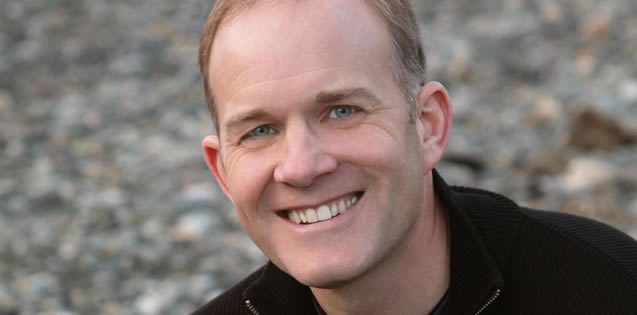Gary Thomas is an author of 14 books, including his bestseller Sacred Marriage. Somehow, in the midst of all that book writing, he has also found the time to author over 150 articles (including some for Boundless) and speak to audiences all over the world about his message of “bringing people closer to Christ and closer to others.” (Did I mention that he’s also married, has three kids, and has competed in 11 marathons?)
We’re honored to have Gary joining us in Colorado Springs for Pursuit 2015, where he will share key principles for relating to the opposite sex, especially when it comes to choosing a spouse. We wanted to get a preview of the kind of wisdom Gary would offer this summer, so we asked some questions about things like marrying a porn user, why single men aren’t getting married, and what it looks like to idolize marriage.
1. Do you think that a young woman should marry a man who occasionally views pornography?
Define “occasional.” Is he fighting it and occasionally re-lapsing? Or is it an accommodated part of his life? If a man isn’t fighting it, by all means, I think a woman is foolish to accept that. More recent research is pretty clear that pornography use will be detrimental — and in some cases, devastatingly so — to a man’s ability to desire his wife and function sexually. Men need to know that the “cost” of pornography is eventual inability to enjoy real sex. That’s Satan’s end-game: give you a taste of solo sex that is often demeaning, fake and based in shame so that you become incapable of sex that honors God, protects your children’s home, helps you bond with a woman, and experience the glory of two people becoming one.
On the other hand, I feel for so many young men who were lured in by pornography well before they had the mental, emotional and spiritual resources to fight a successful battle against it (many of their parents either ignored it or were ignorant of it). By the time they realize they need to fight it, they can be hooked. I’ve worked with some of these men — earnest believers who love God but still struggle because they’ve created neurological grooves in their brains that will make them vulnerable for the rest of their lives. Do I think they can ever be good husbands? Absolutely, I do. But the struggle may never completely go away if they were heavily into it. So it’s a risk a woman needs to consider.
I’ll never forget a healthy young man in his late-20s, married to a cute, adorable young woman his age. The young man confessed to me that, all things considered, he’d rather “take care of himself” than enjoy intimacy with his wife. When the relationship was young and right after they started being sexually intimate, the desire for his wife was there. But once marital relating became a little “routine” (in just a couple years), he found himself wanting to go back to his former habit. That’s tragic — if he doesn’t get professional help, he’ll likely never get over it.
What I’m about to say will sound radical, but hear me out: If you buy a used car, chances are you’ll have a mechanic check it out. Why would you spend more time to have an expert check out a car than a future spouse? If a man or woman has serious sexual issues in their past, including pornography, but also abuse or heavy promiscuity, I think it’s reasonable to ask them to see a counselor and sign a sheet that will allow the counselor to talk to you about this one issue. Let a trained counselor tell you the level of healing, victory and potential this person has for a future healthy relationship. If someone refused to get that kind of check-up, that would be a sign to me that they may still be hiding something.
2. There are a lot of single men out there who say they want to get married, but they have such high standards in every category that, as a practical matter, they’ve made it impossible for themselves. Do you think these men even want to get married? I mean, what is going on with these guys?
That’s a difficult question, because not every guy is alike, and it would be unfair for me to lump them together. But a few observations:
Many of the guys — even Christian guys — who are waiting a long time to get married aren’t being sexually pure. If they had to get married to be sexually active, I think you’d find they’d be a little more eager to do so.
Second, they are likely to either grow up around a dysfunctional marriage or see so many dysfunctional marriages that they are understandably gun-shy. It’s up to my generation to put more emphasis on modeling healthy, fulfilling marriages. Younger men see the pain and destruction, but not the glory. That’s on my generation, not theirs.
But finally, when you view marriage from a selfish perspective — what you’re getting — it’s understandable that you’ll never be “sure” because no woman has it all. Every choice will, by necessity, require some sort of compromise because no one is marrying the fourth member of the Trinity. That being doesn’t exist. If men were more taken up by the call to become a man who loves a woman like Christ loves the church, to raise kids and train them up to follow God, to grow as he learns to serve and love and share, then perhaps they’d start looking at their own failings and immaturity more than criticizing the available women. Marriage is a way for God to work on the man even more than it is for the man to be made happy by the woman.
The cultural messages about what to expect out of marriage are so ridiculous and bent that it’s perhaps inevitable men feel uncertain; they know, in one sense, they’ve been told a lie, but they still don’t want to let go of the false ideal. So they keep waiting, just in case the lie is true. But, men, it’s not.
3. You’ve given a lot of advice about having a healthy marriage. Does writing about the way marriage ought to be make you more self-conscious about your own failures to be the best husband you can be?
Absolutely. Lisa often gets asked what it’s like to have a husband who speaks and writes about marriage so publically. She’s responded so many times, “It would be difficult if I didn’t believe he wasn’t living what he preaches. I couldn’t handle that. But he does.” Her answer, while encouraging, is also sobering; I have a built-in accountability partner. So I pray God will grant me integrity as a husband.
I can’t fix my mistakes in the past, but Lisa has been gracious and forgiving, and she’s forgiving still. She knows no perfect husband exists. She knows I have a number of issues I’m still working on. But writing about marriage and thinking about marriage does challenge me. My writing takes on a new life when I’m most convicted myself. Many of my books are simply monuments to my failures, forgiven by God, and used to offer new insight and point me in a new direction.
4. How did you and your wife meet?
At a junior high church event. We ended up “going together” (’70s slang) for two weeks, then Lisa broke up with me to go on Spring Break with her family. She thought we could get back together after vacation, but during her absence another attractive young woman joined the youth group, and well, I wasn’t the healthiest of “daters,” by any means. We occasionally saw each over the next several years, but Lisa’s family moved out of the area so it was infrequent and haphazard, beyond a bit of letter writing. Then we re-met in college. It took another two years for us to become exclusive again, but after that, we’ve never been apart.
What we both count as special is that we knew each other essentially as kids. Lisa was one of my first girlfriends, and I was actually her very first boyfriend. And now that we’ve been married 30 years, we feel like we have been able to share our entire lives together. Neither of us regret marrying young (Lisa was 19, I was 22). I like that we have faced all our adult life seasons side by side. That might not be for everyone, but it’s meaningful to us.
5. Do you feel like the church and organizations like Boundless run the risk of idolizing marriage by putting such a strong emphasis on moving into that phase of life?
You can idolize anything: food, exercise, money, child-rearing, and even ministry. The antidote isn’t to speak less about these things but to speak more biblically. And I believe that’s what Boundless is trying to do.












